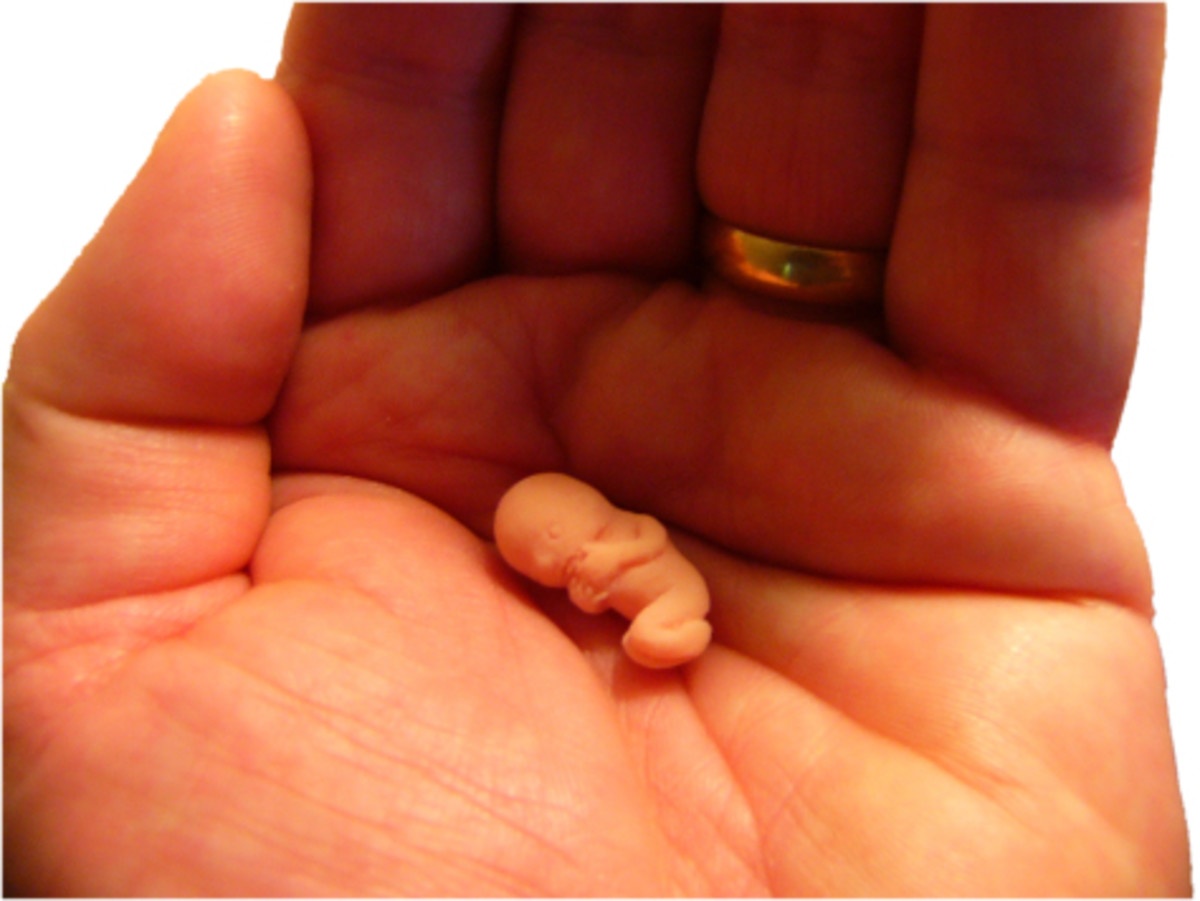So You've Got PCOS


PCOS: A Lot of Crummy Symptoms
PCOS, or polycystic ovary syndrome, affects five to ten percent of women in America. It is an endocrine disorder that combines insulin resistance and an imbalance of hormones (specifically, an excess of androgens) in a woman's body.
PCOS manifests differently in different women. It can cause few to no symptoms, but it typically causes the following:
- periods that are nonexistent, infrequent, extra painful, or irregular in some other way
- increased appetite, weight gain, difficulty losing weight
- gaining weight around the waist ("apple" shape)
- fatigue
- PMS-like symptoms all or much of the time
- acne
- hirsutism - the woman grows hair on her face, chest or back
- infertility
In short, PCOS is a personal-appearance nightmare. It's a self-esteem nightmare for a woman, and perhaps even an identity nightmare. It is sometimes first diagnosed in the late twenties/early thirties, when a woman wants to get pregnant and has difficulty doing so. But its onset may come in puberty. Either way, there's a strong temptation to self-pity.
There is much to be said about how this disorder should be more widely known. Girls and women who are overweight, "lazy" (fatigue), or moody, not to mention plagued with facial hair or acne, tend to be blamed for their symptoms, even (surprisingly) sometimes by doctors. However, much as awareness needs to be raised, that is not the goal of this article. This is written to encourage girls and women with PCOS, to give them both perspective and hope, and even gratitude. So read on, sisters, for your reasons to rejoice.
PCOS is Not Fatal
It is true that left untreated for many years, PCOS can lead to type-2 diabetes, which is a potentially fatal condition. There is also a risk of endometrial cancer - again, for untreated PCOS. And and a consequence of insulin resistance, there can be a higher risk for heart problems. However, PCOS is not an aggressive condition with high fatality rates like certain cancers or like many autoimmune disorders. Nor does it cause life-threatening episodes, as is the case with asthma.
PCOS is Not Disabling or Degenerative
PCOS can make it harder to function as a woman. PCOS sufferers are at higher risk for developing bulemia, for example, and depression, than women without PCOS. That said, PCOS by itself will not cause you to lose the use of your eyes, ears, hands, legs, or mind. Unlike Parkinson's, Muscular Dystrophy, Multiple Sclerosis, or Alzheimer's, it does not sentence you to greater and greater degrees of incapacitation.

PCOS is Not Chronic Pain
Chronic pain is a horrible condition that adversely affects a person's mind and body in just about every way imaginable. It raises stress levels, interferes with sleep, feeds on itself, and rides roughshod on a person's emotions. It can be caused by many, many things, such as old injuries, cancers, or conditions like fybromyalgia. Chronic pain can also live on after the original cause of the pain has been taken care of, apparently because it has taken up residence, so to speak, in the body's nerves and brain.
Many, many people live and try to function with chronic pain. They may not tell us when or why they are in pain. We may not understand why they seem cold or grumpy.
Unless it has also caused endometriosis, PCOS by itself does not normally cause chronic pain. Although PCOS symptoms are bothersome, PCOS sufferers can be grateful we do not have daily pain to deal with.

Treatment for PCOS is Both Possible and Affordable
Here are some medications often prescribed for women with PCOS:
- oral contraceptive pills, to regulate their monthly cycle
- antiandrogens such as Spironolactone, to reduce the effects of excess androgens in the body
- Metformin (brand name Glucophage), which improves the body's response to insulin. (Metformin is also prescribed for diabetics.)
According to the books listed below, using medications for PCOS is not as effective as controlling it by diet and exercise. I have not found this to be the case in my own experience. After starting on this exact combination of medications, in my early twenties, I lost weight without particularly trying to, saw my cravings for sugar reduce, and saw my other symptoms reduce as well. In fact, medications made diet and exercise easier to do.
Metformin in particular has been a wonder drug for me. At age 30, I was able to get pregnant simply by taking an increased dose of Metformin. And in the years since, I have found that Metformin by itself seems able to keep my symptoms under control, without any help from the other drugs.
None of these drugs will break the bank, but Metformin is particularly affordable. Depending on my insurance or lack thereof, I have paid anything from a high of $25 a month for it, to a low of $4. That's right, $4 a month to treat a chronic condition. That's a pretty good deal.
Obviously, my story is not everyone's. Some people have a harder time getting a diagnosis and finding the right combination of medications to get their symptoms under control. But it is possible, especially as PCOS becomes more and more well-recognized.

PCOS is Increasingly Well-Understood
PCOS was first described in 1935 by Irving Stein and Michael Leventhal. For many years, it was viewed as primarily a problem of the reproductive system, and was treated with a surgery called ovarian wedge resection (yikes!).
Now, with increased knowledge, it is seen to be also a metabolic problem, perhaps primarily a metabolic problem. Obviously, this has many good effects, such as treating PCOS with Metformin. Also, it is becoming easier to diagnose women whose symptoms of PCOS are not as extreme.
Going back prior to 1935, women who had PCOS were out of luck. They were on their own to deal with their personal-appearance and fertility issues (and perhaps with diabetes later). So, those of us with PCOS can be thankful that we are alive in the present century, and even more thankful for the strides in understanding PCOS that have been made even in recent years.
Resources are now available for women with PCOS. The two books in the bibliography below were the low-hanging fruit, checked out of my local library. But there are many, many others (try a search on Amazon). See also www.pcosupport.org and www.soulcysters.com .
Despite all this, according to the sources below, there are still some GP doctors who are not aware of PCOS or not very alert to diagnose it. If you think you may have PCOS but are being given other explanations, try seeing an endocrinologist.
Getting Diagnosed with PCOS
Did you have trouble getting a diagnosis for PCOS?

Getting Perspective on PCOS
When I look at the other chronic health problems that I see in my friends, family, and in the news ... this is going to sound strange, but if, prior to being born, I had been told, "You have to have a chronic health problem, pick one," then for all the reasons listed above, PCOS would have been a "good" one to pick. We don't get to pick, of course, but I would take PCOS any day over Muscular Dystrophy, Multiple Sclerosis, or, any number of other ailments.
If you'll pardon a churchy parable, thinking about PCOS reminds me of a story ...
A woman had been given a cross (representing an ongoing difficulty) that she found just too heavy to carry. She told the Lord, "I can't carry this cross any more. Please take it away," and He replied, "Here is a room full of crosses. You may put yours back and take another one of your choosing."
The woman leaned her cross against the wall and looked at the forest of crosses all around her. She had not imagined there would be so many, or so large. Some were so big she could only see the foot. Finally, after looking around for a long time, she picked up the smallest one she could find and said, "This one."
The Lord looked at her with love and told her gently, "That's the one you came in with."
PCOS is the one we came in with, ladies. And now - perhaps for the first time in history - it is possible to live a healthy, happy life with PCOS.
Good luck to you all.
Bibliography: Two Books About PCOS
PCOS for Dummies, by Gaynor Bussell, RD, and Sharon Perkins, RN. Hoboken, NJ: John Wiley & Sons, Inc., 2011. 268 pages.
What Nurses Know ... PCOS, by Karen Roush, RN, MSN, FNP. New York: Demos Medical Publishing, 2010. 156 pages.








